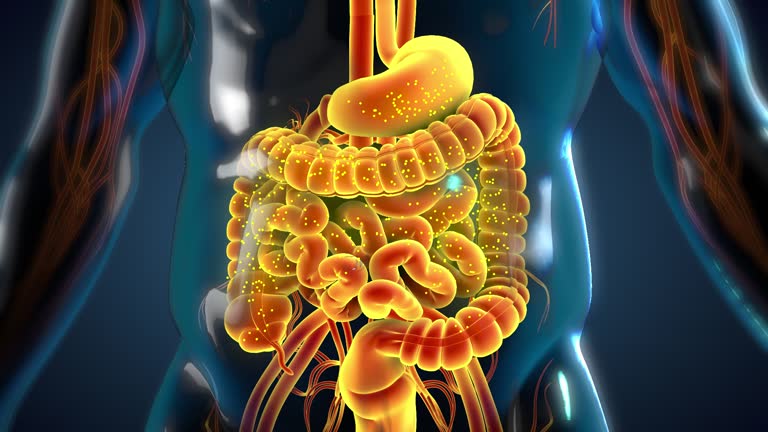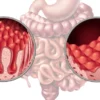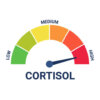
Irritable Bowel Syndrome (IBS) is a complex and often frustrating condition, affecting nearly 1 in 10 people worldwide. While a variety of factors increase the risk of developing IBS, these changes in gut function impair digestion and lead to a wide range of symptoms. This is where digestive enzymes come into the spotlight. But do they really help? And how do you know if they’re right for you?
In this article, we’ll unpack the science behind digestive enzymes, explore their potential benefits for IBS sufferers, and provide practical guidance to help you make an informed decision.
What Are Digestive Enzymes?
Digestive enzymes are proteins that help break down food into nutrients your body can absorb. They are produced naturally by the body, primarily in the salivary glands, stomach, pancreas, and small intestine.
These enzymes ensure that carbohydrates, proteins, and fats are broken down efficiently during the digestion process and enter the body in the most efficient way.s
Types of Digestive Enzymes
There are several key types of digestive enzymes:
· Amylase: Breaks down carbohydrates into sugars. Present in saliva and the pancreas.
· Protease: Breaks down proteins into amino acids. Produced in the stomach and pancreas.
· Lipase: Breaks down fats into fatty acids and glycerol. Produced in the pancreas.
· Lactase: Helps digest lactose, the sugar in dairy products. Produced in the small intestine.
· Cellulase: Breaks down cellulose (plant fibre), though not produced naturally in the human body.
Each of these enzymes plays a vital role in the digestive process. If one or more are lacking, it can lead to incomplete digestion and symptoms such as bloating, gas, diarrhoea, or constipation, all typical features of IBS.
How Digestive Enzymes Work in the Gut
When you eat, digestive enzymes begin their work almost immediately. Salivary amylase starts the breakdown of carbohydrates in the mouth. As food travels through the stomach and into the small intestine, other enzymes are secreted to further digest the food.
If your body doesn’t produce enough of a particular enzyme, certain foods may ferment in the gut rather than being digested properly. This fermentation process often leads to excessive gas production, cramping, and irregular bowel movements.
It’s also possible for changes in the microbiome in the small or large intestine to lead to alterations in the fermentation process. Since more fermentation takes place, which can lead to gas and bloating, the introduction of enzymes may help to reduce these symptoms.
How Digestive Enzymes Can Benefit IBS
There is growing interest in how enzyme supplementation may alleviate IBS symptoms. While research is still emerging, many individuals with IBS have reported symptom improvement with the use of digestive enzymes.
Improving Digestion and Reducing IBS Symptoms
For people with IBS, especially those with food intolerances or sensitivity to certain carbohydrates (such as those found in the FODMAP group), digestive enzymes can help break down problematic components of food more effectively. This can lead to:
· Reduced bloating and abdominal discomfort
· More regular bowel movements
· Decreased gas production
· Less urgency and cramping after meals
For example, someone with lactose intolerance (common among IBS sufferers) may benefit from taking lactase enzymes before consuming dairy. Similarly, enzymes that help break down oligosaccharides (a type of FODMAP) may ease symptoms when eating beans or cruciferous vegetables.
Enzyme Supplements for IBS: Do They Help?
Though more large-scale studies are needed, existing research and anecdotal evidence suggest that digestive enzyme supplements can be beneficial for certain IBS sufferers:
A small study found that a combination of enzymes significantly reduced bloating and fullness after meals.
Another trial using an enzyme blend targeting FODMAPs showed promise in easing abdominal symptoms.
It’s important to note, however, that enzyme supplements are not a cure for IBS. They are best used as a supportive strategy alongside dietary changes and other treatments. Some people may notice dramatic improvements, while others might only see mild changes or none at all.
Potential Side Effects of Digestive Enzymes for IBS
While generally considered safe, digestive enzyme supplements can sometimes cause side effects, particularly if taken in high doses or without proper guidance.
Common side effects may include:
· Nausea
· Diarrhoea or constipation
· Abdominal pain
· Allergic reactions (rare)
People with certain health conditions, such as pancreatitis or ulcers, should use enzyme supplements with caution. As with any supplement, it’s advisable to consult a healthcare professional before starting.
Choosing the Right Digestive Enzyme Supplement
Not all enzyme supplements are created equal. The formulation, dosage, and additional ingredients can all influence their effectiveness.
Factors to Consider When Selecting an Enzyme Supplement
· Targeted Enzyme Blends: Choose products designed specifically for IBS or for the types of foods you struggle to digest (e.g., lactase for dairy, alpha-galactosidase for legumes).
· Third-Party Testing: Look for supplements that have been independently tested for quality and purity.
· Delivery Format: Capsules tend to be most effective, but powders or chewables may suit those with swallowing difficulties.
· Free from Irritants: Choose products free from common allergens, artificial additives, and FODMAP ingredients.
Working with a dietitian or nutritional therapist can also help tailor your enzyme use to your unique digestive profile.
Lifestyle Changes Along with Digestive Enzymes for IBS Relief
While digestive enzymes can be helpful, they work best as part of a broader IBS management plan. This may include:
· Low FODMAP diet: Temporarily reducing fermentable carbohydrates can significantly reduce IBS symptoms.
· Mindful eating: Chew thoroughly, eat slowly, and avoid overeating to aid digestion.
· Stress management: Chronic stress impacts gut function. Practices like yoga, breathing exercises, or cognitive behavioural therapy (CBT) can support gut-brain health.
· Hydration and sleep: Staying well-hydrated and prioritising quality sleep are essential pillars of digestive health.
When these lifestyle adjustments are combined with targeted digestive enzyme support, many people experience noticeable improvements in their IBS symptoms.
When to Consult a Healthcare Professional
While digestive enzymes are available over the counter, professional guidance is invaluable. If you suspect you’re not digesting food properly, or if IBS symptoms persist despite dietary changes, it’s wise to consult a registered dietitian or gastrointestinal specialist.
They can help:
· Identify specific enzyme deficiencies
· Rule out other conditions (like coeliac disease or IBD)
· Design a personalised digestive support plan
· Address the underlying causes of IBS symptoms
Conclusion
Digestive enzymes offer a promising avenue for relieving IBS symptoms, particularly when food sensitivities or poor digestion are part of the picture. Though not a silver bullet, they can be an effective part of a comprehensive IBS strategy.
Contact the clinic for a free assessment of your symptoms and how we can support you.
References
Verywell Health — The 6 Best Digestive Enzymes, According to a GIDietitian
Monash FODMAP — Digestive Enzymes and IBS
Dr. Ruscio — The Truth About Digestive Enzymes for IBS
Medical News Today — Do digestive enzymes for IBS work? Supplements and benefits
Healthline — Digestive Enzymes for IBS: Best Supplements and Benefits
Harvard Health Publishing — Digestive enzymes: How supplements like Lactaid and Beano can help with digestion
CenterWatch via ClinicalTrials.gov — Digestive Enzyme Formulation Intervention in IBS Patients Who Previously Clinically Responded to Mediterranean LFD
Frontiers in Physiology — Inhibition of Serine Proteases as a Novel Therapeutic Strategy for IBS Abdominal Pain
ScienceDirect (Trends in Food Science & Technology) — Reduction of FODMAP content by bioprocessing
PubMed Central / J Dig Dis — Enzyme therapy for functional bowel diseaselike post-prandial distress (multi-digestive enzymes for IBS symptoms)
Last Updated
Uploaded by Martin Cohen on 09/08/2025






